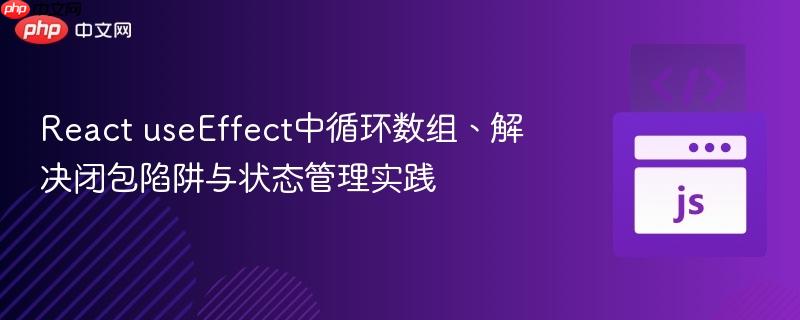
本文深入探讨了在react `useeffect`中使用`setinterval`循环展示数组内容时常见的挑战。我们将解决数组负索引访问错误、`useeffect`闭包导致的陈旧状态问题,并提供两种解决方案:利用`useref`获取最新状态,以及通过优化索引管理逻辑实现无缝循环。旨在帮助开发者理解并避免这些陷阱,编写更健壮的react组件。
引言
在React应用中,我们经常需要实现动态展示内容的功能,例如轮播图或自动更新的列表。useEffect结合setInterval是实现这类功能的常用模式。然而,当涉及到从一个大型数组中按批次(例如每次3项)提取并展示数据,并在到达数组末尾时重新开始循环时,开发者常常会遇到一些棘手的问题,例如数组索引错误、useEffect闭包带来的陈旧状态(Stale State)问题,以及循环逻辑中断等。本文将深入分析这些问题,并提供健壮的解决方案。
核心问题剖析
在实现数组循环展示时,主要会遇到以下几个核心问题:
1. 不正确的数组索引访问
在javaScript中,尝试使用负数索引(例如 Array[-1])来访问数组元素是无效的。这不会像python等语言那样从数组末尾开始计数,而是会返回 undefined。
例如,原始代码中的判断条件:
这里的 currentTestimonials[-1] 会得到 undefined。对 undefined 调用 .localeCompare() 方法会抛出运行时错误,导致逻辑无法正常执行。
解决方案:使用 .at() 方法
ES2022引入的 .at() 方法允许我们使用负数索引来从数组的末尾访问元素。array.at(-1) 可以安全地获取数组的最后一个元素。
// 获取数组的最后一个元素 const lastItem = currentTestimonials.at(-1);
2. useEffect中的闭包陷阱与陈旧状态
当 useEffect 的依赖数组为空([])时,其内部的副作用函数(包括 setInterval 的回调)只会执行一次,并且会捕获(close over)组件第一次渲染时的状态和 props。这意味着在 setInterval 的回调函数中,你访问到的 currentTestimonials 变量始终是组件初次渲染时的值,即使 currentTestimonials 状态在外部已经被 setCurrentTestimonials 更新了。这就是所谓的“陈旧状态”或“闭包陷阱”。
在原始代码中,useEffect 内部的 setInterval 回调函数捕获了初次渲染时的 currentTestimonials。因此,无论 setCurrentTestimonials 如何更新状态,if 语句中 currentTestimonials 的值始终是最初的 [testimonials[0], testimonials[1], testimonials[2]]。这导致循环重置的逻辑(if (currentTestimonials[-1] …))永远无法正确判断当前展示的项是否到达了父数组的末尾,从而导致循环在最后几项时中断。
此外,let maxIndex = 2; 变量在组件每次渲染时都会被重新初始化为 2。然而,useEffect 内部的 setInterval 回调函数捕获的是初次渲染时 maxIndex 的引用。在这个闭包内部,maxIndex 会被正确地 maxIndex += 3 和 maxIndex = 2 更新。虽然这在特定场景下(如内部计数器)可以工作,但它不够直观,且如果 maxIndex 需要影响组件的其他部分,则容易造成混淆。
解决方案与最佳实践
针对上述问题,我们可以采取以下几种解决方案:
方案一:利用 useRef 解决闭包陷阱
useRef 提供了一个在组件生命周期内持久存在的、可变的引用。我们可以利用它来存储 currentTestimonials 的最新值,从而在 setInterval 回调中访问到非陈旧的状态。
实现步骤:
- 创建一个 useRef 实例,并用 currentTestimonials 的初始值初始化它。
- 在 useEffect 内部,setInterval 回调中使用 currentTestimonialsRef.current 来访问最新的展示项。
- 每次 currentTestimonials 状态更新后,也同步更新 currentTestimonialsRef.current。
- 在 setInterval 内部更新 currentTestimonialsRef.current 后,调用 setCurrentTestimonials 触发组件重新渲染。
import { useEffect, useRef, useState } from 'react'; export default function SOCarousel({ testimonials }) { // maxIndex 可以在这里作为局部变量,或者为了更清晰地管理,使用 useState // 这里我们沿用原答案的 let 方式,但会在注意事项中说明 useState 的优势 let maxIndex = 2; const [currentTestimonials, setCurrentTestimonials] = useState([ testimonials[maxIndex - 2], testimonials[maxIndex - 1], testimonials[maxIndex], ]); // 使用 useRef 存储 currentTestimonials 的最新值 const currentTestimonialsRef = useRef(currentTestimonials); useEffect(() => { // 确保 ref 始终指向最新的 state currentTestimonialsRef.current = currentTestimonials; }, [currentTestimonials]); // 当 currentTestimonials 变化时更新 ref useEffect(() => { const interval = setInterval(() => { // 在 interval 回调中,通过 ref 访问最新的状态 if ( currentTestimonialsRef.current .at(-1) // 使用 .at(-1) 安全访问最后一个元素 .localeCompare(testimonials.at(-1)) === 0 // 比较是否到达父数组的最后一个元素 ) { console.log('HERE: Reached end of testimonials, resetting index.'); maxIndex = 2; // 重置索引 } else { console.log('ADD THREE: Moving to next set of testimonials.'); maxIndex += 3; // 增加索引 } // 更新 ref 中的值 currentTestimonialsRef.current = [ testimonials[maxIndex - 2], testimonials[maxIndex - 1], testimonials[maxIndex], ]; // 调用 setCurrentTestimonials 触发组件重新渲染 setCurrentTestimonials(currentTestimonialsRef.current); }, 1000); // 清理函数,避免内存泄漏 return () => clearInterval(interval); }, [testimonials]); // 依赖 testimonials,如果 testimonials 变化,重新设置 interval return ( <div className='carosel-container flex'> {currentTestimonials.map((testimonial, index) => ( <div className='testimonial' key={index}> {/* 添加 key 属性 */} <p>{testimonial}</p> </div> ))} </div> ); }
注意: 在上述 useRef 方案中,maxIndex 仍然是 useEffect 闭包内部捕获的 let 变量。为了让 currentTestimonialsRef.current 始终保持最新,我们添加了一个额外的 useEffect 依赖于 currentTestimonials 来更新 ref。
方案二:简化索引管理,避免复杂状态同步
更简洁的方法是直接管理一个表示当前起始索引的变量,并基于此变量计算要展示的项。通过检查这个索引是否超出父数组的长度来判断是否需要重置。这种方法通常不需要 useRef 来解决陈旧状态问题,因为我们关注的是索引的逻辑,而不是 currentTestimonials 数组本身的最新值。
实现步骤:
- 使用 useState 来管理 maxIndex(或 currentIndex),这样它的值在每次渲染和 setInterval 调用之间都是最新的。
- 在 setInterval 回调中,更新 maxIndex 状态。
- 通过比较 maxIndex 和 testimonials.Length 来判断是否需要重置循环。
- 基于最新的 maxIndex 计算并设置 currentTestimonials。
import { useEffect, useState } from 'react'; export default function Carousel({ testimonials }) { // 使用 useState 管理索引,使其在组件生命周期内保持最新 const [maxIndex, setMaxIndex] = useState(2); const [currentTestimonials, setCurrentTestimonials] = useState([ testimonials[maxIndex - 2], testimonials[maxIndex - 1], testimonials[maxIndex], ]); useEffect(() => { const interval = setInterval(() => { console.log('ADD THREE: Moving to next set of testimonials.'); // 计算下一个 maxIndex let nextMaxIndex = maxIndex + 3; // 判断是否超出父数组长度,如果超出则重置 if (nextMaxIndex > testimonials.length) { console.log('reached end of testimonials! Resetting index.'); nextMaxIndex = 2; // 重置为初始索引 } // 更新 maxIndex 状态 setMaxIndex(nextMaxIndex); // 根据新的 nextMaxIndex 更新 currentTestimonials setCurrentTestimonials([ testimonials[nextMaxIndex - 2], testimonials[nextMaxIndex - 1], testimonials[nextMaxIndex], ]); }, 1000); // 清理函数 return () => clearInterval(interval); }, [maxIndex, testimonials]); // 依赖 maxIndex 和 testimonials,确保获取最新值 return ( <div className='carousel-container flex'> {currentTestimonials.map((testimonial, index) => ( <div className='testimonial' key={index}> <p>{testimonial}</p> </div> ))} </div> ); }
对比与选择:
- 方案一 (useRef):适用于需要在 setInterval 中访问复杂对象(如 currentTestimonials 数组)的最新状态进行逻辑判断,且该状态频繁更新的场景。它通过 ref 提供了一个“逃生舱口”来获取最新值。
- 方案二 (简化索引管理):更推荐的方案,尤其是当你的循环逻辑主要依赖于一个简单的计数器或索引时。将索引作为状态 (useState) 管理,可以确保 setInterval 内部始终能访问到最新的索引值,从而避免陈旧状态问题,并且代码逻辑更清晰,更符合React的状态管理范式。
注意事项与最佳实践
-
useEffect 依赖项:
- [] 空数组表示 useEffect 只在组件挂载时运行一次,并且捕获初次渲染时的变量。适用于一次性设置事件监听或只依赖于不变值的场景。
- 如果 useEffect 内部的逻辑依赖于组件的 props 或 state,务必将这些依赖项添加到依赖数组中(例如 [maxIndex, testimonials]),以确保 useEffect 在这些依赖项变化时重新运行,捕获最新的值。
- 在方案二中,useEffect 依赖于 maxIndex 和 testimonials。当 maxIndex 更新时,useEffect 会重新运行,清除旧的 setInterval 并设置新的,新的 setInterval 回调会捕获到最新的 maxIndex 值。
-
清理函数:
- 在 useEffect 中使用 setInterval 或其他副作用时,务必在返回一个清理函数(return () => clearInterval(interval))。这会在组件卸载时,或 useEffect 重新运行时(如果依赖项改变),清除之前的副作用,防止内存泄漏和不必要的行为。
-
Key 属性:
- 在 map 渲染列表时,为每个列表项提供一个唯一的 key 属性至关重要。这有助于React高效地更新列表,提高性能。


